冀教版八年级英语最全现在完成时讲解
冀教版初二英语上册《Unit 2 单元语法专题》课件

join → be in;die → be dead;
buy → have;borrow,lend → keep eg:The game has been on for five minutes. 比赛已经开始五分钟了。
冀教版初二英语上册
典例 He ________ his hometown for twenty years. A
Yes,you/I have.No,you/I haven't.
Yes,he/she/it
has.
No,he/she/it
hasn't.
Yes,you/we/they No,you/we/
have.
they haven't.
冀教版初二英语上册
典例 —When will you hand in your book report? D —Sorry,I'm not sure. I ________writing it yet.
【点拨】has gone to “已经去了某地”,has been to“去过 某地”。根据答句“她将在两天后回来。”可知Mrs. Smith 是去了澳大利亚,故选B。
冀教版初二英语上册
典例 —Have you seen Mrs. Smith recently? —No. She ________ Australia on business. B She'll come back in two days. A.has come to C.has gone in B.has gone to D.has been to
He really misses it!(贵州黔西南)
A.has been away from C.has left B.left D.is away from
冀教版八年级英语上unit2-现在完成时

• been in/at 逗留在某地(已经一段时间).常和for ten days, since I came here等连用。
• eg. She has been in Shanghai since she moved there.
• 5.Mr. and Mrs. Green have_____in China for a week. A.been B.got C.arrived D.reached
• 6.--Where's Mary? --Oh,she _____the library.
A. has gone to B. went to
• ⑵ 若保留for+时间段,since+时间点/从句,或 用在 how long句型中,则需将终止性动词改为 相应的状态动词或延续性动词。
• 常见终止性动词与延续性动词(或状态动词)的 对应关系如下:
• come/go/arrive/get/reach/move------be in/at open----be open
• 初中英语课本中常见终止性动词有: leave, go, come, arrive, begin, buy, borrow, die, join, become等。终止性动词要表示持续时,可用以 下方法:
• ⑴ 将时间状语改为时间段 + ago,句中谓语动 词用一般过去时。
• eg. My brother joined the army two years ago. 我 弟弟参军两年了。
• --Yes,Have a look at it, please.
• 3.So far,spaceships without people ___________ (reach) the moon and some other parts of the universe.
冀教版八年级下册Units 7~8语法总结[1]
![冀教版八年级下册Units 7~8语法总结[1]](https://img.taocdn.com/s3/m/21fb74c35022aaea998f0f6f.png)
冀教版八年级下册Units 7~8语法总结7单元语法总结:现在完成时的用法一、用法1. 表示过去发生或已经完成的某一动作对现在造成的影响或结果。
强调影响或结果现在仍然存在,而不强调动作本身。
例如:—Have you ________ your breakfast yet? 你吃早饭了吗?—Yes, I have. I’ve ________ had it. (现在不饿了)是的,我吃了。
我刚刚吃过。
2. 表示过去已经开始,持续到现在的动作或状态,可以和表示从过去某一时刻延续到现在(包括“现在”在内)的一段时间的状语连用,如for+时间段/ since+时间点。
例如:I’ve known him ________ five years. 我认识他5年了。
I have studied English ________ 2001. 从2001年起我就(开始)学英语。
3. 表示到现在为止的这段时间中所进行的动作或工作的积累。
例如:____________________________________________. 我已经去过美国三次了。
二、现在完成时与一般过去时的区别现在完成时表示过去发生的某一动作对现在造成的影响或结果,强调的是现在的情况,所以它不能和表示过去的时间状语连用。
而一般过去时只表示过去的动作或状态,和现在不发生联系,它可以和表示过去的时间状语连用,如yesterday, last night, three weeks ago, in 1990等。
例如:I have seen the film. (我了解这部电影的内容) 我看过这部电影。
I saw the film last week. (只说明上星期看了这部电影,不涉及现在的情况) 我上星期看了这部电影。
He has lived here since 2000. (他现在还住在这里) 自从2000年以来他一直住在这里。
He lived here in 2000. (不涉及现在他是否还住在这里) 2000年的时候,他住在这里。
冀教版英语八年级下册知识点总结
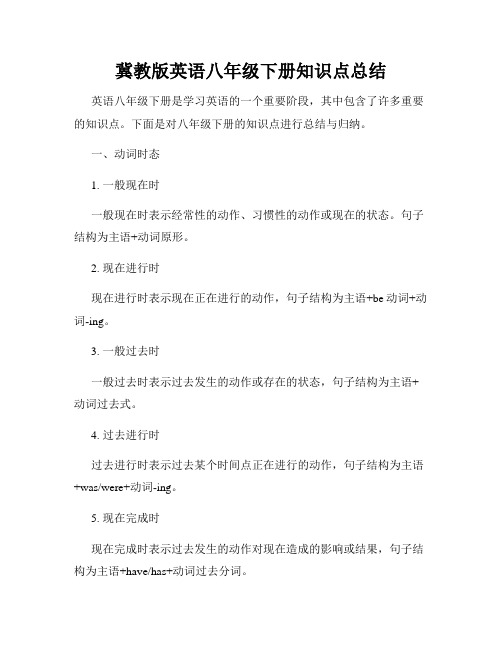
冀教版英语八年级下册知识点总结英语八年级下册是学习英语的一个重要阶段,其中包含了许多重要的知识点。
下面是对八年级下册的知识点进行总结与归纳。
一、动词时态1. 一般现在时一般现在时表示经常性的动作、习惯性的动作或现在的状态。
句子结构为主语+动词原形。
2. 现在进行时现在进行时表示现在正在进行的动作,句子结构为主语+be动词+动词-ing。
3. 一般过去时一般过去时表示过去发生的动作或存在的状态,句子结构为主语+动词过去式。
4. 过去进行时过去进行时表示过去某个时间点正在进行的动作,句子结构为主语+was/were+动词-ing。
5. 现在完成时现在完成时表示过去发生的动作对现在造成的影响或结果,句子结构为主语+have/has+动词过去分词。
6. 过去完成时过去完成时表示过去某个时间点之前已经发生的动作,句子结构为主语+had+动词过去分词。
二、被动语态被动语态表示动作的接受者在句子中的位置比较靠前,句子结构为主语+be动词+动词过去分词。
三、条件句1. 第一类条件句第一类条件句表示与现在或将来的事实相反或不太可能发生的情况,句子结构为:if + 简单现在时,主句将来时。
2. 第二类条件句第二类条件句表示与现在或将来的事实相反或不太可能发生的情况,句子结构为:if + 过去式,主句将来时。
3. 第三类条件句第三类条件句表示与过去事实相反的情况,句子结构为:if + 过去完成时,主句将来完成时。
四、情态动词1. can/couldcan表示能力、许可或可能性;could表示过去的能力、许可或可能性。
2. may/mightmay表示许可、请求或可能性;might表示过去的许可、请求或可能性。
3. mustmust表示必须或推测。
4. shouldshould表示建议或期望。
五、名词性从句名词性从句可以作为主语、宾语、表语或同位语,句子结构为:连接代词/连接副词 + 主句。
六、形容词和副词的比较级与最高级1. 比较级 :比较级表示两者之间的程度或大小的比较,结构为:主语+be动词+形容词的比较级+than。
Unit 2 My Favourite School Subject一般将来时态和现在完成时态 课件( 冀教版八年级上)
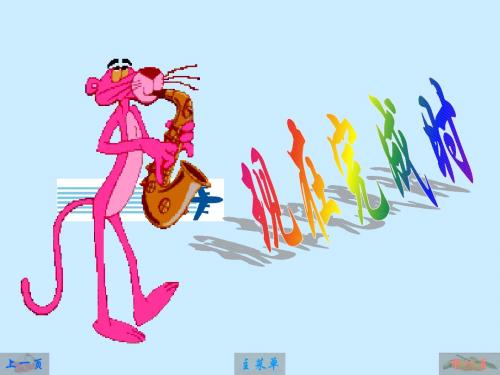
He’s learned about 5,000 English words since he went to college.
(他上大学以来大约学了五千个英语单词。)
上一页
主菜单
下一页
★五、for短语表示动作延续多长时
间,for的宾语为时间段。
We have known each other for twenty years.
“汽车开走了吗?” “是的,已经开走了。” “不,还没有开走。 ”
上一页 主菜单
下一页
★二、ever和never也是现在完成时常
见的时间状语。前者意思是“曾 经”,多见于疑问句或否定句中; 后者意思是“从来没有”,表示全 部否定。 “Have you ever seen the film?” “No. I have never seen it.”
上一页 主菜单
下一页
现在完成时的主要用法
二.表示从过去某一时刻开始并一直延 续到现在的动作或事情,但动作或事 情可能仍在继续。
I want to see how much the place changed since I saw it last.我想看看从上
次见到那地方以来它发生了多大变化。
I have learnt English for more than ten years.我已经学了10多年的英语。
This is the first time he has driven a car .
这是他第一次开车。
上一页
主菜单
下一页
现在完成时的主要用法
五.现在完成时和最高级连用表示到现 在为止是最…的。
What a boring film!
八年级英语现在完成时知识点
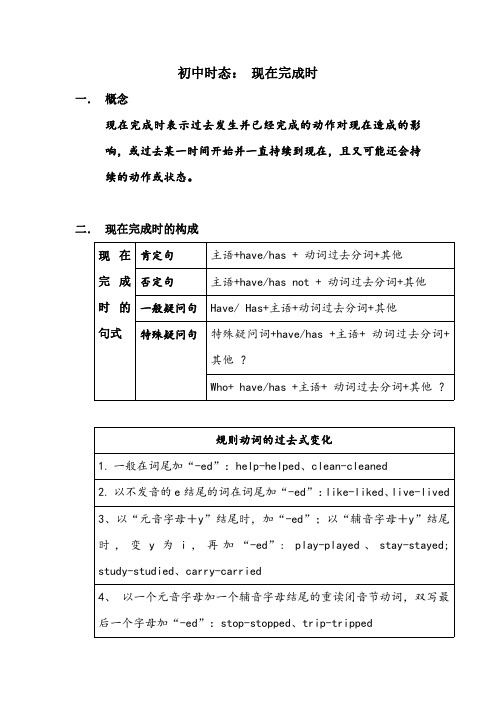
初中时态:现在完成时一.概念现在完成时表示过去发生并已经完成的动作对现在造成的影响,或过去某一时间开始并一直持续到现在,且又可能还会持续的动作或状态。
二.现在完成时的构成现在完成时的句式肯定句主语+have/has+动词过去分词+其他否定句主语+have/has not+动词过去分词+其他一般疑问句Have/Has+主语+动词过去分词+其他特殊疑问句特殊疑问词+have/has+主语+动词过去分词+其他?Who+have/has+主语+动词过去分词+其他?规则动词的过去式变化1.一般在词尾加“-ed”:help-helped、clean-cleaned2.以不发音的e结尾的词在词尾加“-ed”:like-liked、live-lived3、以“元音字母+y”结尾时,加“-ed”;以“辅音字母+y”结尾时,变y为i,再加“-ed”:play-played、stay-stayed; study-studied、carry-carried4、以一个元音字母加一个辅音字母结尾的重读闭音节动词,双写最后一个字母加“-ed”:stop-stopped、trip-tripped三.现在完成时的用法1.表示过去发生并已经完成的动作对现在造成的影响:I have heard of the man.2.过去某一时间开始并一直持续到现在,且又可能还会持续的动作或状态:I have lived in this city since I was born.四.常与一般现在时连用的时间状语already,yet(常用于否定句和疑问句中表示“仍,还”),before, recently,never,ever,once,twice等。
I have already finished my homework.固定的短语:for+一段时间,since+过去时间点+ago,so far, up to now,in the past/last three yearsI have been here since two months ago.五.难点拓展1.since和for的区别since用来说明动作的起始时间,for用来说明动作延续的时间长度。
(完整版)八年级下现在完成时全面知识点
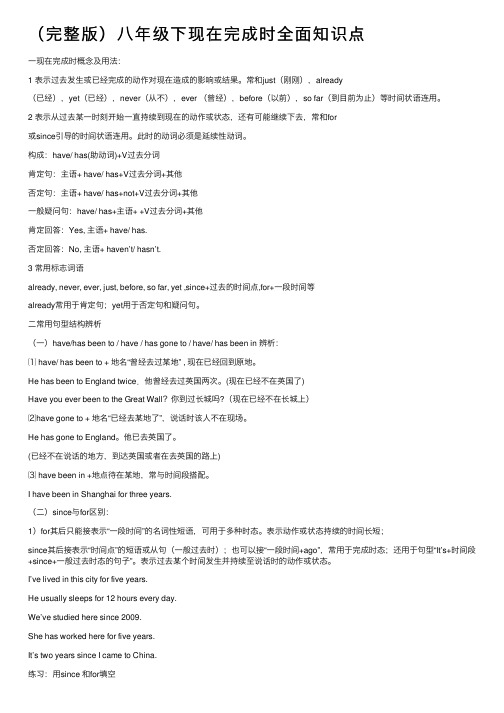
(完整版)⼋年级下现在完成时全⾯知识点⼀现在完成时概念及⽤法:1 表⽰过去发⽣或已经完成的动作对现在造成的影响或结果。
常和just(刚刚),already(已经),yet(已经),never(从不),ever (曾经),before(以前),so far(到⽬前为⽌)等时间状语连⽤。
2 表⽰从过去某⼀时刻开始⼀直持续到现在的动作或状态,还有可能继续下去,常和for或since引导的时间状语连⽤。
此时的动词必须是延续性动词。
构成:have/ has(助动词)+V过去分词肯定句:主语+ have/ has+V过去分词+其他否定句:主语+ have/ has+not+V过去分词+其他⼀般疑问句:have/ has+主语+ +V过去分词+其他肯定回答:Yes, 主语+ have/ has.否定回答:No, 主语+ haven’t/ hasn’t.3 常⽤标志词语already, never, ever, just, before, so far, yet ,since+过去的时间点,for+⼀段时间等already常⽤于肯定句;yet⽤于否定句和疑问句。
⼆常⽤句型结构辨析(⼀)have/has been to / have / has gone to / have/ has been in 辨析:⑴ have/ has been to + 地名“曾经去过某地” , 现在已经回到原地。
He has been to England twice.他曾经去过英国两次。
(现在已经不在英国了)Have you ever been to the Great Wall?你到过长城吗?(现在已经不在长城上)⑵have gone to + 地名“已经去某地了”,说话时该⼈不在现场。
He has gone to England。
他已去英国了。
(已经不在说话的地⽅,到达英国或者在去英国的路上)⑶ have been in +地点待在某地,常与时间段搭配。
英语初二上冀教版unit2lesson16课文讲解和练习
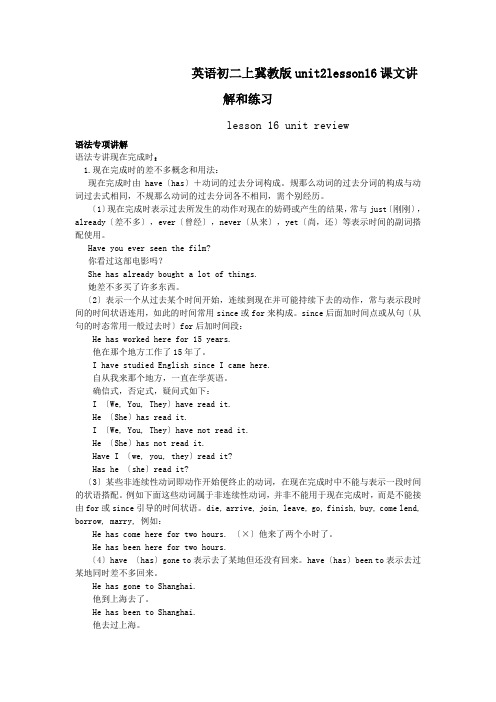
英语初二上冀教版unit2lesson16课文讲解和练习lesson 16 unit review语法专项讲解语法专讲现在完成时:1.现在完成时的差不多概念和用法:现在完成时由have〔has〕+动词的过去分词构成。
规那么动词的过去分词的构成与动词过去式相同,不规那么动词的过去分词各不相同,需个别经历。
〔1〕现在完成时表示过去所发生的动作对现在的妨碍或产生的结果,常与just〔刚刚〕,already〔差不多〕,ever〔曾经〕,never〔从来〕,yet〔尚,还〕等表示时间的副词搭配使用。
Have you ever seen the film?你看过这部电影吗?She has already bought a lot of things.她差不多买了许多东西。
〔2〕表示一个从过去某个时间开始,连续到现在并可能持续下去的动作,常与表示段时间的时间状语连用,如此的时间常用since或for来构成。
since后面加时间点或从句〔从句的时态常用一般过去时〕for后加时间段:He has worked here for 15 years.他在那个地方工作了15年了。
I have studied English since I came here.自从我来那个地方,一直在学英语。
确信式,否定式,疑问式如下:I 〔We, You, They〕have read it.He 〔She〕has read it.I 〔We, You, They〕have not read it.He 〔She〕has not read it.Have I 〔we, you, they〕read it?Has he 〔she〕read it?〔3〕某些非连续性动词即动作开始便终止的动词,在现在完成时中不能与表示一段时间的状语搭配。
例如下面这些动词属于非连续性动词,并非不能用于现在完成时,而是不能接由for或since引导的时间状语。
冀教版八年级英语上册现在完成时讲解课件 (共38张PPT)

2.这位老人已经死了十年了。
The old man has died for ten years. W The old man has been dead for ten years/since 10 years ago.
时,过去式 )
主菜单
上一页
下一页
短暂性动词与延续性动词问题
时间段
for some time 、since、how long
● for some time 、since、how long 必须与延续性动 词连用 ,短暂性动词否定句中,才可以与时间段连用。 He has died for 3 years 错 He has been dead for 3 years. 对 但下俩句正确:I haven’t bought the bike for a year. 我买这辆自行车还不到一年。 She hasn’t come here for an hour. 她来这儿还没有一个小时。
上一页
主菜单
下一页
比较:
①.我们买这本书三年了.
We have had the book for three years.
We bought the book three years ago.
②他感冒三天了. He has had a cold for three days.
He caught a cold three days ago.
上一页 主菜单
下一页
become →be, begin→ have , borrow → keep, buy → have, die→ be dead, finish→ be over, come (go, arrive, get)→be here / there / in…, join the army → be in the army… (be a member of … ) leave→ be away ( from…), go to school---be in school sit down ----sit , stand up ---stand catch (get) a cold --- have a cold join the Party---be a Party member fall asleep--- be asleep close --- be closed open---- be open
Unit2现在完成时知识梳理及专项练习冀教版八年级英语上册
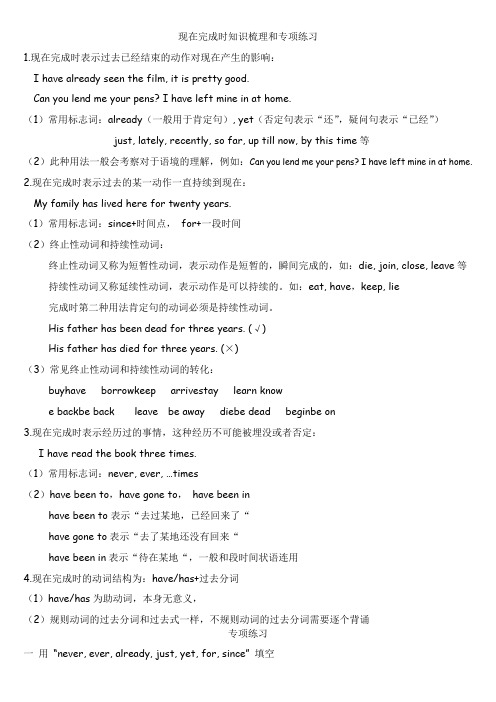
现在完成时知识梳理和专项练习1.现在完成时表示过去已经结束的动作对现在产生的影响:I have already seen the film, it is pretty good.Can you lend me your pens? I have left mine in at home.(1)常用标志词:already(一般用于肯定句), yet(否定句表示“还”,疑问句表示“已经”)just, lately, recently, so far, up till now, by this time等(2)此种用法一般会考察对于语境的理解,例如:Can you lend me your pens? I have left mine in at home.2.现在完成时表示过去的某一动作一直持续到现在:My family has lived here for twenty years.(1)常用标志词:since+时间点,for+一段时间(2)终止性动词和持续性动词:终止性动词又称为短暂性动词,表示动作是短暂的,瞬间完成的,如:die, join, close, leave等持续性动词又称延续性动词,表示动作是可以持续的。
如:eat, have,keep, lie完成时第二种用法肯定句的动词必须是持续性动词。
His father has been dead for three years. (√)His father has died for three years. (×)(3)常见终止性动词和持续性动词的转化:buyhave borrowkeep arrivestay learn knowe backbe back leave be away diebe dead beginbe on3.现在完成时表示经历过的事情,这种经历不可能被埋没或者否定:I have read the book three times.(1)常用标志词:never, ever, …times(2)have been to,have gone to,have been inhave been to表示“去过某地,已经回来了“have gone to表示“去了某地还没有回来“have been in表示“待在某地“,一般和段时间状语连用4.现在完成时的动词结构为:have/has+过去分词(1)have/has为助动词,本身无意义,(2)规则动词的过去分词和过去式一样,不规则动词的过去分词需要逐个背诵专项练习一用“never, ever, already, just, yet, for, since” 填空1. I have _______ seen him before, so I don’t know him.2. Jack has _________ finished his homework.3. Mr. Wang has taught in this school ________ ten years.4. “Have you ________ seen the film?” “No, I have ________ seen it.”5. I have been in Tangshan______ three years ago.二用所给词的适当形式填空1. I____ already ____ (see) the film.2. _____ he ____ (finish) his work today? Not yet.3. My father ____ just ____ (e) back from work. He is tired now4.____ you ______ (find) your science(科学)book yet?5. He never(visit)________________ Hangzhou before.6. I never (hear)_____________________ her speak in public.7. Bill (not find)_______________ his watch yet.9. I (hear)____________ the news already.10.I am not hungry. I just (have)________________ my dinner.11.____ you ______ (find) your science(科学)book yet?12. I __________ (work) here since I ______ (move) here in 1999.13. How long ________ the Wangs ______________(stay) here ? For two weeks.14.He (not speak)___________ to me since we quarrel.(争吵)15. Harry Potter is a very nice film. I_______ (see)it twice .三单选( )1 —______ you ___ your homework yet ?—Yes. I _____ it a moment ago.A. Did; do; finished B. Have; done; finishedC. Have; done; have finished D. will; do; finish( ) 2.Who will go to the station to meet Jerry?I will. I _____ her several(几次)times.A. metB. have metC. had metD. will meet( ) 3.My mother _______ the windows already, so the room looks much brighter.A. has cleanedB. had cleanedC. is cleaningD. will clean( ) 4. My mother_________ the windows already, so the room looks much brighter(更明亮).A. has cleanedB. had cleanedC. is cleaningD. will clean( ) 5. A: ______ you ______ your homework yet?B: Yes. I______ it a moment ago.A. Did; do; finishedB. Have; done; have finishedC. Have; done; finishedD. will; do; finish( ) 6. A: Have you written anything on Chinese traditional food so far?B: __________, but I have a plan for it.A. Ever sinceB. Later onC. Not yetD. From now on( ) 7. I _____ the army three years ago. I ________ the army for three years.A joined, have joinedB have joined, was inC joined, have been in( ) 8.Our teacher went to Beijing last week, she _________ for seven days.A leftB have leftC was awayD has been away四句型题1. He has already finished his homework.(改为否定句)He ______ finished his homework ______.2. This factory opened twenty years ago.(同义句转换)This factory _______ ______ __________for twenty years.3. Miss Gao left an hour ago. (同义句转换)Miss Gao ________ _______ ________ ________ an hour ago.4. Her mother has been a Party member for three years .(同义句)Her mother _______ the Party three years ________.5. The Green Family moved to France two years ago. (同义句转换)_______ two years ________ the Green family moved to France.6. They have been here since 2000. (对划线部分提问)have they been here?7. I have been to Macau before. (改为否定句)I _________ _________ been to Macau before.8. He hasn’t e to school because he was ill. (就划线部分提问)______ _______ he e to school?9. I bough a new bike just now. (用just改写)I ____ just ____ a new bike.。
冀教版八年级上册英语语法知识点总结

冀教版八年级上册英语语法知识点总结Simple Present XXX一般现在时态的否定和疑问形式:否定和疑问形式需要用到do/does。
例如:I like my picture.改写为:I don't like my picture.Do you like your picture?What do you like?XXX.改写为:She doesn't like purple.Does she like purple?What does she like?XXX Present Perfect XXX:1.构成:助动词have/has+动词的过去分词,即have/has done。
现在以动词work为例子,将现在完成时态的肯定形式、否定形式、疑问形式及简略答语讲解一下。
肯定形式:I/You have worked.XXX.XXX.否定形式:I/You have not worked.He/She/It has not worked.We/You/They have not worked. 疑问形式及简略答语:Have I/you worked?Yes。
you/I have.No。
you/I have not.XXX/it worked?Yes。
he/she/it has.No。
he/she/it has not.Have we/you/they worked?Yes。
you/we/they have.No。
you/we/they have not.2.基本用法:A。
表示过去发生或已经完成的某一动作对现在造成影响或结果。
例如:I have just XXX.洗衣服是过去发生的动作,对现在造成的结果是“衣服洗干净了”。
B。
表示过去已经开始,持续到现在的动作或状态,常和表示从过去某一时刻延续到现在包括“现在”在内的一段时间状语连用。
例如:We have XXX.3.现在完成时常和already。
冀教版八年级英语上册Unit3现在完成时

【考点精练】
考 ( ) 3.—How long can I ________ the book?
点
—Two weeks.
梳
A.borrow B.lend
理
C.keep
D.get
( ) 4.Her father ________in 1990 and her husband
_________ for more than five years.
A.died, dead
B.has died, dead
C.died, has been dead
D.has died, has died
ቤተ መጻሕፍቲ ባይዱ
1.--Ann has gone to Shanghai. ---So __D__ her parents.
A has B do C did D have 2.– I have watched the game.
keep
finish — be over
buy — have
open— be open
begin/start —be on
close— be closed
join — be in + 组织机构 或者 be a member of + 组织机构
fall ill — be ill
catch a cold —
用have(has) gone to, have (has)been to, have(has) been in 填空
Tim_____h_a_s__g_o_n_e__out.He’ll be back in an hour.
Jim______________this city for two years.
新冀教版八年级上册英语期末复习专项二 现在完成时

Has has
visited
第八页,共十二页。
专项二 现在完成时
have been to
travelled on
have
been to
第九页,共十二页。
专项二 现在完成时
spent
haven’t found
yet
already
第十页,共十二页。
专项二 现在完成时
a went have seen
from
interesting
taken
第十一页,共十二页。
seen
专项二 现在完成时
haven’t climbed
haven’t done
it
第十二页,共十二页。
第五页,共十二页。
专项二 现在完成时
Have
talked
has gone
have looked
has been
第六页,共十二页。
专项二 现在完成时
has written haven’t sent How long has
第七页,共十二页。
stayed
专项二 现在完成时
for two years
专项二 现在完成时)
第一页,共十二页。
专项二 现在完成时
B
D B
第二页,共十二页。
专项二 现在完成时
B
C C
第三页,共十二页。
专项二 现在完ห้องสมุดไป่ตู้时
C
C D
C
第四页,共十二页。
专项二 现在完成时
has read
have known
has taught
haven’t finished
hasn’t left have been
冀教版初中英语现在完成时知识讲解(1)+练习

现在完成时【用法讲解】一、现在完成时的定义现在完成时表示过去发生或已经完成的某一动作对现在造成的影响或结果。
现在完成时二、现在完成时的构成1. 肯定句现在完成时的肯定句式是“have(has)+过去分词”。
注意:该句式中的have或has是助动词,has用于第三人称单数,其它人称一律用have。
2. 否定句:现在完成时的否定句式是“haven’t(hasn’t)+过去分词”。
3. 疑问句:现在完成时的一般疑问句式是把助动词have或has提到主语之前。
回答用Yes, …have(has)./ No, …haven’t(hasn’t).三、动词过去分词规则变化与不规则变化(一) 规则变化变化规则:与动词过去式规则相同。
1. 一般直接在词尾加上ed。
look —looked2.以e结尾的动词,直接加d。
move —moved3. 以y结尾,y前面是辅音字母的动词,变y 为i,再加ed。
carry —carried4. 部分动词需双写尾字母,加ed。
stop —stopped(二)不规则变化不规则动词的变化因词而异。
但是如果对不规则动词的过去式和过去分词做一分析,就可发现其中的“规则”。
同学们在记忆时,可按下面的形式对教材后不规则动词表进行分析、整理。
例如:AAB型四、现在完成时的用法现在完成时表示过去某时发生的行为对主语目前产生的影响。
即用过去发生的某个行为来说明现在的某种情况。
例如:We are good friends. (现在的情况)我们是好朋友。
I knew him in 1997. (过去的动作) 我1997年认识了他。
We have known each other since 1997. 我们自从1997年相互认识。
(现在完成时把过去的动作和现在联系起来并着眼于现在)(1) 表示动作发生在过去某个不确定的时间,但对现在留下了某种影响和结果。
常被just、already、yet 等副词修饰。
冀教版初中英语八年级现在完成时课件

How long have you lived in Beijing ? 构成:特殊疑问词+一般疑问句?
(改为否定句和一般疑问句并肯否回答) I have seen him since his wedding day.
→I haven’t seen him since his wedding day .
1. (北京,2016) It's nice to see you again. We __C_ each other since 2014.
A. won't see
B. don't see
C. haven't seen D. didn't see
2. (陕西,2016) My mother _B__ a good example for me since I was young.
has been in Yes, he ___________ here for several days.
has gone 5 . Where is Peter? I don’t know where he ________.
现在完成时的含义 基本句型 注意事项
• before.
joined
• lie’shsaisstebre_e_n_____(join) the club last week.
2.have /has been to,have / has gone to, have / has been in的用法区别
1 “ Have /has been to+地名 ”表示曾经去过某地,说话时已经回到说话 地点,常与once 、twice、ever、never 等时间连用。 2 “ have / has gone to +地名 ”表示去某地了,现在没有回答,人不在 说话地点。 3 “ have / has been in +地名 ”表示“在某地”。指一种存在状态
冀教版八年级英语最全现在完成时讲解

冀教版八年级英语最全现在完成时讲解现在完成时一、基本结构:1、肯定句:主语+have/has+过去分词(done)+其他成分.2、否定句:主语+have/has+not+过去分词+其他成分.3、一般疑问句:Have/Has+主语+过去分词+其他成分.回答: Yes, 主语 + have/has.(肯定)No, 主语 + haven't/hasn't.(否定)二、用法(1)现在完成时表示过去发生或已经完成的动作对现在造成的影响或结果I have spent all of my money. (含义是:现在我没有钱花了.)Lily has (just/already) come. (含义:Lily现在在这儿)My father has gone to work.(含义是:我爸爸现在不在这儿)(2)现在完成时可以用来表示发生在过去某一时刻的, 持续到现在的动作或状态,常与for(+时间段),since(+时间点或过去时的句子)连用.①for+时段②since+过去时间(译为:自从……以来)③since+从句(过去时)④It is+时段+since+从句(过去时)Mary has been ill for three days.I have lived here since 1998.三、has gone (to), has been (to), has been (in) 的区别1、Have/Has gone(to) :去了(现在不在说话现场)Where is your father?He has gone to Shanghai.2、Have/Has been (to) :去过(已不在去过的地方)My father has been to Shanghai.3、Have/has been in:呆了多久(还在所呆的地方)My father has been in Shanghai for two months. /since two months ago.四、现在完成时的标志1、现在完成时的含义之一是过去完成的动作对现在仍有影响,用以下四大标志词可以表达这种含义:(1)以already, just和yet为标志He has already got her help.他已得到她的帮助。
冀教版八年级上册英语 现在完成时(共24张PPT)

二.现在完成时态句型转换
A. He died ten years ago. 1.--- He has been dead for ten years. 2.--- It has been ten years since he died. 3.--- It is ten years since he died 4.--- Ten years has passed since he died. 5.--- He has been dead since ten years ago. B. I joined the League 2 years ago. 1.--- I have been in the League for 2 years. 2.--- I have been a League member for 2 years. 3.--- It has been 2 years since I joined the League. 4.--- It is 2 years since I joined the League. 5.--- 2 years has passed since I joined the League.
1.We/see2.visitors/visit(sea world)
•
Tourists/see/visit
1.They/enjoy2.He/watch(waterfall)
1.Sun/set/ 2.We/watch(sunset)
1.It/rain 2. trees/get
1.train/arrive 2.trains/leave
• 2) He left Fuzhou just now.
• He _______ ________ ________ _________ Fuzhou for five minutes.
八年级英语暑假专题 学习现在完成时 冀教版 知识精讲

八年级英语暑假专题学习现在完成时冀教版【本讲教育信息】一. 教学内容:暑假专题:聚焦现在完成时[学习过程]一、构成1. 肯定式:have (has)+动词的过去分词。
例如:They have bought a puter. 他们买了一台电脑。
The Wangs have been to England once. 王先生一家去过英国一次。
【提示】have 和has 是助动词, 无具体含义。
两者的缩略形式分别为’ve 和’s。
当主语是第三人称单数时用has;其他人称用have。
2. 否定式:have (has)+not+动词的过去分词。
例如:We haven’t finished reading the book. 我们还没有读完这本书。
Lucy hasn’t found her dictionary so far. 露西目前还没有找到她的词典。
3. 一般疑问式:Have / Has+主语+过去分词+…? 例如:—Have you seen her lost dictionary? 你看见她丢失的词典了吗?—Yes, I have. 是的,我看见了。
二、用法1. 表示“完成”现在完成时表示过去发生或已经完成的动作对现在造成的影响或结果。
谓语可以是延续性动词或非延续性动词。
例如:I have just washed my face. 我刚刚洗了脸。
(“洗脸”的动作发生在过去,对现在造成的结果是:脸是干净的。
)She has seen the film. 她看过这部电影。
(“看电影”的动作发生在过去,对现在造成的影响是:了解电影的内容。
)2. 表示“未完成”表示过去已经开始,一直持续到现在或将来的动作或状态。
谓语必须是延续性动词。
例如:She’s studi ed English for about two years. 她学英语大约有两年了。
(现在已学了两年,有可能仍在继续学。
)We have lived here since we were born. 自从出生以来,我们一直住在这里。
八年级英语寒假专题(一)冀教版知识精讲

初二英语寒假专题(一)冀教版【本讲教育信息】一. 教学内容:寒假专题(一)(一)现在完成时现在完成时有两种含义:⑴表示在过去发生的动作对现在造成的影响和结果;⑵表示从过去某一时间一直延续到现在的动作。
其肯定结构是:主语+ have (has) +过去分词+其他①She has cleaned the bedroom.她已经打扫过卧室了。
②I have studied English for more than three years.我已经学习英语三年多了。
其否定结构是:主语+ have (has)+not +过去分词+其他③I haven’t been to Beijing. = I have never been to Beijing.我没有去过北京。
疑问形式是:Have / Has + 主语 + 过去分词+ 其他④Have you ever been to Hong Kong?你去过香港吗?动词的过去式和过去分词的变化规则包括规则变化和不规则变化两种。
规则变化有:▲一般情况下加ed talk- talked – talked▲以e结尾的加d change-changed-changed ▲以辅音字母加y结尾的,变y为i再加ed study-studied-studied ▲以重读闭音节结尾,末尾只有一个辅音字母的,要双写这一辅音字母再加ed stop-stopped-stopped不规则变化有:speak-spoke-spoken come- came- comeblow-blew-blown go- went - gonebuild-built-built be-was/ were- beenhave-had-had write- wrote- writtendo-did-done真题演练:1. -Is Jack speaking?-No, he isn’t in right now. He _____ the cinema with his aunt.A. has been toB. has gone toC. have been toD. have gone to2. “The world without thief” is a very moving film. I _____ it twice already.A. will seeB. seeC. sawD. have seen3. _____ you _____ China for a long time?A. Have; come toB. Did; comeC. Have; been inD. Have; gone to4. -Oh, Mrs. King, your dress looks nice. Is it new?-No, I _____ it since two years ago.A. hadB. boughtC. have hadD. have happened5. Mr. Li _____ England. He _____ London for two weeks.A. has been to; has gone toB. has gone to; has been inC. has been to; has been inD. has gone to; has been to答案:1. B 2. D 3. C 4. C 5. B(二)动词的ing 形式。
- 1、下载文档前请自行甄别文档内容的完整性,平台不提供额外的编辑、内容补充、找答案等附加服务。
- 2、"仅部分预览"的文档,不可在线预览部分如存在完整性等问题,可反馈申请退款(可完整预览的文档不适用该条件!)。
- 3、如文档侵犯您的权益,请联系客服反馈,我们会尽快为您处理(人工客服工作时间:9:00-18:30)。
现在完成时一、基本结构:1、肯定句:主语+have/has+过去分词(done)+其他成分.2、否定句:主语+have/has+not+过去分词+其他成分.3、一般疑问句:Have/Has+主语+过去分词+其他成分.回答: Yes, 主语 + have/has.(肯定)No, 主语 + haven't/hasn't.(否定)二、用法(1)现在完成时表示过去发生或已经完成的动作对现在造成的影响或结果I have spent all of my money. (含义是:现在我没有钱花了.)Lily has (just/already) come. (含义:Lily现在在这儿)My father has gone to work.(含义是:我爸爸现在不在这儿)(2)现在完成时可以用来表示发生在过去某一时刻的, 持续到现在的动作或状态,常与for(+时间段),since(+时间点或过去时的句子)连用.①for+时段②since+过去时间(译为:自从……以来)③since+从句(过去时)④It is+时段+since+从句(过去时)Mary has been ill for three days.I have lived here since 1998.三、has gone (to), has been (to), has been (in) 的区别1、Have/Has gone(to) :去了(现在不在说话现场)Where is your father?He has gone to Shanghai.2、Have/Has been (to) :去过(已不在去过的地方)My father has been to Shanghai.3、Have/has been in:呆了多久(还在所呆的地方)My father has been in Shanghai for two months. /since two months ago.四、现在完成时的标志1、现在完成时的含义之一是过去完成的动作对现在仍有影响,用以下四大标志词可以表达这种含义:(1)以already, just和yet为标志He has already got her help.他已得到她的帮助。
He has just seen the film.他刚刚看过这场电影。
He hasn't come back yet.他还没有回来。
(2)以ever和never为标志This is the best film I have ever seen.这是我曾经看过的最好的一部电影。
He has never been to Beijing.他从没有到过北京。
(3)以动作发生的次数为标志He says he has been to the USA three times. 他说他已经去过美国三次了。
(4)以so far(到目前为止)为标志+beforeHe has got to Beijing so far.到目前为止他已到了北京。
She has passed the exam so far.到目前为止她已经通过了考试。
2.过去已经开始的动作一直延续到现在, 甚至有可能继续延续下去,我们可以从动作“延续”的特性和“时间”点段的区分入手,进一步学习现在完成时。
①for+时段②since+过去一个时间点(过去从句)为标志注意:1)现在完成时不能单独与过去的时间状语连用, 如yesterday, last week, three years ago 等;五、过去分词(一)规则动词:规则动词的过去分词的构成规则与规则动词的过去式的构成规则相同。
(1) 一般动词,在词尾直接加“ ed ”。
work---worked---worked ,visit---visited---visited(2) 以“ e ”结尾的动词,只在词尾加“ d ”。
live---lived---lived ,(3) 以“辅音字母+ y ”结尾的动词,将"y" 变为"i" ,再加“ ed ”。
study---studied---studied ,cry---cried---cried(4) 重读闭音节结尾,末尾只有一个辅音字母,先双写该辅音字母,再加“ ed ”。
stop---stopped---stopped , drop---dropped--dropped(二)不规则动词:1、AAA型原型过去式过去分词burst burst burst cast cast cast cost cost cost cut cut cuthit hit hit hurt hurt hurt let let let put put putset set set shut shut shut spread spread spreadread read read read原形发音为/ri:d/,过去式和过去分词发音为/red/2、AAB型beat beat beaten3、ABA型become became become run ran run come came come特殊情况4、ABB型bring brought brought buy bought bought build built built burn burnt burntcatch caught caughtdig dug dugfeel felt felt fight fought fought find found foundhear heard heard hold held heldkeep kept keptlay laid laid lead led led lose lost lostmake made made meet met metsell sold sold shoot shot shot sit sat sat stand stood stoodsweep swept sweptteach taught taught tell told told think thought thoughtwin won won5、ABC型begin began begun blow blew blown break broke brokenchoose chose chosendraw drew drawn drive drove driven drink drank drunkfly flew flown forgive forgave forgiven forget forgot forgotten freeze froze frozengive gave given grow grew grownknow knew knownride rode ridden rise rose risen ring rang rungshake shook shaken sing sang sung sink sank sunk swim swam swum swim swam swumthrow threw thrownwrite wrote written六、瞬间动词(buy, die, join, come,go ,leave, join ……)不能直接与for /since 连用。
要改变动词begin-----be on borrow -----keep buy----haveclose -----be closed come/arrive/reach/get to-----be indie----be deadfinish----be overgo out----be outleave ----be awayopen----be open★1、have代替buyMy brother has had(不能用has bought) this bike for almost four years.★2、用keep或have代替borrowI have kept(不能用have borrowed) the book for quite a few days.★3、用be替代becomeHow long has your sister been a teacher?★4、用have a cold代替catch a coldTom has had a cold since the day before yesterday.★5、用wear代替put onb)用“be+形容词”代终止性动词1、be+married代marry2、be+ill代fall (get) ill3、be+dead代die4、be+asleep代fall (get) asleep5、be+awake代wake/wake up6、be+gone代lose,die,sell,leave7、be+open代open 8、be closed代close/shut9、be+missing(gone,lost)代losec)用“be+副词”代终止性动词1“be+on”代start, begin2“be+up”代get up3“be+ba ck(to)”代return to, come back to, go back to4“be here (there)”代come(arrive, reach, get) here或go (arrive, reach, get) there 等等d)用“be+介词短语”代终止性动词1.“be in/at +地点”代替go to /come to2.用be in the army 代替join the army3.“be in/at +地点”代替move to常用瞬间动词变延续性动词表:1. have arrived at/in sw. got to/reached sw. come/gone/moved to sw.→have been in sw./at…相应的介词2. have come/gone back/returned → have been back3. have come/gone out →have b een out4. have become → have been5. have closed / opened→ have been close/open6. have got up → have been up;7. have died → have been dead;8. have left sw. → have been away from sw.9. have fallen asleep/got to sleep → have been asleep;10. have finished/ended/completed → have been over;11. have married → have been married;12. have started/begun to do sth. → have done sth.;13. have begun → have been on14. have borrowed/bought →have kept/had15. have lost → haven’t had16. have put on →have worn17. have caught /get a cold → have had a cold;18. have got to know → have known19. have/has gone to → have been in20. have joined/have taken part in the league/the Party/the army→have been a member of/ have been in/have been the Party’s member/the league member/the soldier…现在完成时练习(一)A)选用have, has填空:1.I _______ told him the news.2.She ________ come back from school.3.You ________ won the game.B)按要求改写下列各句:4.They have bought a computer.(改成否定句)_________________________________________5.He has lost his book.(先改成一般疑问句,再作肯定与否定回答)_________________________________________C) 单项选择6. -Where have you _____, Kate? -I've ______ to the bank.A. gone, goneB. been, beenC. gone, beenD. been, gone7. Her grandfather ______ for two years.A. diedB. has diedC. has been deadD. has been died8. It's six weeks ______ I met you last. A. when B. since C. before D. for9. Tom and Jack have arrived at West Hill Farm already.A. have gotB. have gone toC. have been toD. have reached现在完成时练习(二)一、单项选择。
